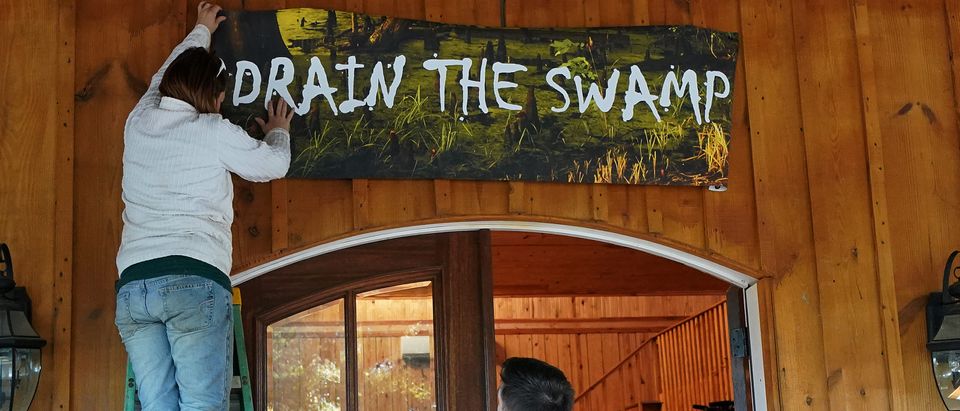Of all the grotesque ooze to come out of Washington since Donald Trump began his great unmasking of our impudent elite, the most repulsive is the sanctimony and phony piety of the media and its friends. The latest display of this defining characteristic of the Beltway swamp is the assault on a White House staffer for an off-color remark in a private conversation.
As reports have stated, Kelly Sadler, who works in communications at the White House, attempted a joke about Arizona Senator John McCain’s illness and mortality. The comment fell flat in the meeting, joining the thousands of similar such remarks made privately on any given day in the trenches of the executive and legislative branches of government, where cynicism is an unattractive but, for most of us, necessary method of occasionally blowing off steam. This is true especially in high stress, highly adversarial jobs like dealing with the media.
Journalists too indulge in this practice—often unashamedly. While it is a fictional and dated rendering, the off-color cynicism of old-school reporters was wonderfully captured in the movie Broadcast News. In it, a slick media executive laid off a long-serving worker and oddly asked how he could be of assistance to the man, to which the salty journalist replied: “Well, I certainly hope you die soon.”
Less humorous real-world examples include the disgusting performance of the media elite at last month’s White House correspondence dinner, where journalists invited an unfunny, mean-spirited comedian to assail not only President Trump but also White House press secretary Sarah Sanders, seated nearby as the guest of honor. To date, only one major media organization has vowed to forego participation in this disgraceful annual spectacle.
More broadly, any given press conference at the White House reveals a venomous, hate-filled collection of political activists asking questions of no import to average Americans, but of salacious value to those in our elite rooting for the president to fail at any cost.
Along with this daily performance comes self-reference and self-involvement remarkable even by the low standards of our current political discourse. It is perhaps best summed up by the new motto of the Trump-obsessed Washington Post, the anti-Republican attack machine of billionaire Jeff Bezos and his fellow monopolists at Amazon, which asserts that “Democracy Dies in Darkness.” It’s one thing to pump out political opinion—I do it myself—but quite another to pretend that it is fair and balanced journalism or that its absence will lead to darkness and tyranny.
To these swamp critters, Sadler has committed two offenses, one spoken and the other unspoken.
First, Sadler committed cynicism against the Washington Republican whom the media love the most. For there are two John McCains. One comes from a line of decorated Navy admirals, and is himself a hero of the Vietnam War. McCain was shot down after many successful missions and refused early release lest he be used for enemy propaganda.
But there is another John McCain, who styles himself as a maverick but in effect represents the Republican establishment in Washington and handed the White House to Barack Obama in 2008. This McCain carefully cultivates ties with the progressive media and last year delivered the deciding vote that saved Obamacare from repeal. He has been the most consequential anti-Trump Republican, refusing to honor the president even after Trump accomplished such professed McCain priorities as spurring economic expansion, reviving the depleted military, and getting tough on China and Iran.
For Sadler to criticize that John McCain was beyond the pale for progressive reporters and some establishment Republicans, who quickly invoked the other John McCain in attempting the professional assassination of the staffer—and in their daily sport of trying to damage the president.
Sadler’s second sin is her job. At the White House she works in communications, and while everyone who supports Trump is persona non grata to Washington’s upper crust, those who explain his policies to the public are considered by them to be the worst of the worst.
Sadler’s focus is surrogate outreach—getting the key facts and narrative out to those opinion-influencers who support the administration or who at least will give it a fair shake. By definition, this involves going around the hostile Washington press corps in order to reach the public. It is not surprising that a Beltway media that has ruined its credibility by joining the political opposition to Trump, and which as a result is less relevant with each passing day, hates this idea—and the woman who personifies its practice.
So, how does this latest Washington farce end? The press would undoubtedly love for Trump to fire Sadler, just so they could spend another week crowing about the matter. That outcome is highly unlikely. While Trump dispenses with staff far more than other modern presidents, he likely sees no benefit from doing a favor for McCain or the reporters who hate Trump’s guts. Instead, the issue will fade as soon as the media and our elite find something else about which to preen and signal virtue. Outside the Beltway, Americans will forgive someone who, like they, has said something off-color in private—especially if that person is performing the valuable public service of resisting the fake news media.
Christian Whiton was a State Department senior advisor in the Trump and George W. Bush administrations. He is the author of “Smart Power: Between Diplomacy and War.”
The views and opinions expressed in this commentary are those of the author and do not reflect the official position of The Daily Caller.


